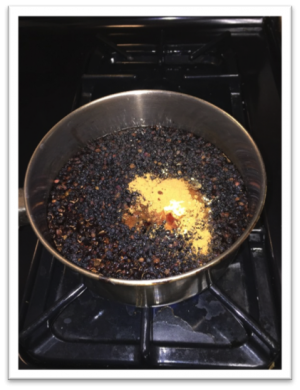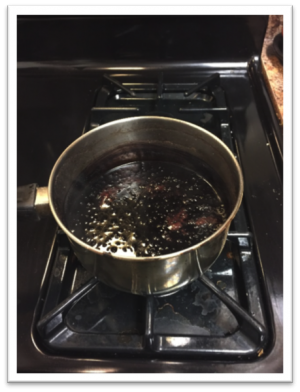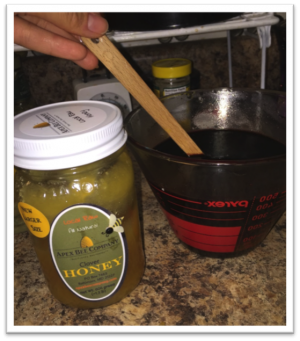
How to Beat the Flu in 48 Hours
Dear Living Well Daily Reader,
“You’re a walking lab experiment!”
That’s what my best friend told me after I gave her the rundown of my recent supplement protocol to beat a cold I had pick up seven days prior.
This bug was a nasty one. In the past, I’ve been able to stop a cold in its tracks within a day or two, sometimes in as little as eight hours. But on day five of this one, I still had sinus pressure, congestion, a runny nose, headaches, and fatigue.
I had been using my regular cold-busting protocol: vitamin C tablets, oregano oil, Airborne, zinc, green vegetable juices, and my secret weapon of medicinal mushrooms: a product called AHCC.
AHCC is no joke. It has remarkable ability to boost the immune system and is used in Japan as an adjuvant cancer treatment. When my sister and mother had the flu last year, I made them both take AHCC. My sister’s fever broke an hour after taking it, and she was back to good in just a day or two.
When my mom took AHCC, within an hour or two, she went from being confined to the couch under the covers to being up and active, taking down Christmas decorations.
Every time I feel a tickle in the back of my throat, have any sinus pressure, or sneeze one too many times, I take a few capsules of AHCC and it stops a cold in its tracks. I also use it when traveling.
But this recent bug was immune to my attempts to squash it.
(I know, I know, a terrible double pun.)
So I opened up my herbal remedy books and looked for something new to try, and there I found it:
Elderberries.
The Science
Elderberries have been used in folk medicine for hundreds of years to treat colds, flu, and upper respiratory tract infections. Now modern research is confirming the wisdom of our ancestors.
Elderberry has shown antiviral activity against H1N1 (swine flu) infection in a test tube study. In fact, it compared in effectiveness to Tamiflu, the prescription drug that may help reduce the duration of the flu.
The dark berries appear to stimulate the immune system, which may be how they help fight the virus. They also have potent antioxidant activity. One in vitro study found that elderberry has stronger antioxidant properties than blueberries, which are known for their high amounts of antioxidants.[1]
In fact, the anthocyanin content of elderberries is the highest of any food measured by the USDA, nearly doubling the amount found in other fruits. Anthocyanins are the flavonoid compounds responsible for giving the berries their deep dark color, and, most importantly, their antioxidant ability.
But there is more than just test tube studies. Three human studies have been done showing that elderberry can reduce the symptoms and duration of the flu.
In one study of 60 people, 15 ml of elderberry syrup given four times a day helped relieve symptoms four days sooner than the placebo. The group given elderberry needed less rescue medication as well.[2]
Another study found that folks given Sambucol, a standardized elderberry extract, had significant improvements in their symptoms within two days. Ninety percent of that group had a complete resolution of their flu within two-three days, whereas the group given a placebo suffered for at least six more days.[3]
In a third study, 64 people were given either four doses of an elderberry lozenge or placebo for two days. By the end of the second day, 28% of the group given the elderberry lozenges were completely recovered from their flu symptoms, and another 60% had a significant relief of symptoms. In comparison, only 16% of the placebo group experienced relief from symptoms, and the rest either stayed the same or got worse.[4]
That was enough evidence for me to give it a try, so I trudged out to my local MOM’s Organic Market to look for some.
I took the 2 teaspoon dose immediately and then again later that evening.
The next morning, day six, I took a dose immediately when I woke up and again at noon. By 3 p.m., I felt 90% better. I continued taking it three times a day for the next few days.
Now, it could certainly have been a placebo effect, or that the cold had just run its course. But my little n=1 experience gave me positive results, so I’m adding this natural remedy to my winter arsenal.
Also, its tastes awesome.
You can easily find Sambucol elderberry syrup at most drugstores, but it’s pricey: You’ll pay almost $1 per dose. If you get hit with the flu tomorrow, it’s worth the expense. But if you want to take as a daily preventative, it’s much more cost-effective to make at home, and it’s very simple. The recipe below (without the spices) ends up being 21 cents per dose.
Homemade Elderberry Syrup
Combine 1/2 cup of dried elderberries and 3½ cups of water in a saucepan and bring to a boil. You can also add spices if you like. I added 2 tablespoons of dried ginger, 1 teaspoon of cinnamon and a 1/2 teaspoon of clove powder.

Ginger, cinnamon, and clove add additional antioxidant and antiviral properties to the syrup.
Bring the mix to a boil and then reduce the heat and simmer for about 25 minutes, until the liquid has been reduced by about half.

Reduce the liquid by half.
Remove from heat and pour through a strainer to remove the solids. Let the liquid cool to lukewarm and add 1 cup of raw honey (use local honey if you can). Stir well.

Honey acts as a natural preservative and also has antibacterial properties.
Store the elderberry syrup in a mason jar or other glass container and keep it in your fridge to extend the shelf life. Honey acts as a natural preservative, but if you notice it start to smell funky or develop mold, toss it.
I plan to take 1 tablespoon syrup daily during the winter months for prevention. If I do catch a bug or virus, I’ll increase the dose to three times a day until the symptoms are gone.
You can also mix it in with green smoothies or hot tea or drizzle it on grain-free paleo pancakes.
Safety and Precautions
Elderberry extract has been studied in humans for 12 weeks with no harmful effects on kidney and liver function, blood lipids, or blood glucose.[5] But due to its ability to stimulate the immune system, people with autoimmune conditions should avoid elderberry unless under the supervision of a trained herbalist or medical professional.
The leaves, stem, bark, seeds, and unripened fruit contain cyanogenic glycosides, which convert to cyanide when consumed, so never eat those parts of the plant unless they have been cooked. Cooking destroys the harmful compounds.
Lastly, if you make your own elderberry syrup, be aware that honey should not be given to infants under 1 year of age.
To living well,

Jasmine LeMaster
Health Researcher
Sources:
[4] Pilot Clinical Study on a Proprietary Elderberry Extract: Efficacy in Addressing Influenza Symptoms
View More Free Articles
The Walking Problem Nobody Talks About (And Why It Matters)
You’ve been walking nearly your entire life. You mastered it before you could tie your shoes—and you’ve been putting one foot in front of the other for decades now without giving it a second thought. But what if I told you that the way you walk right now could be the difference between living independently...
Stop Starving Yourself—"Forbidden" Weight Loss Secret WORKS
Completely cutting out the foods you love from your diet is a recipe for disaster. You know the drill—you swear off chocolate, potato chips, or whatever your weakness is, only to find yourself face-first in a family-size bag three weeks later, wondering what went wrong. Good news—science has finally caught up with common sense. A...
Why Your Muscles Are Your Brain's Best Defense
Forget expensive brain scans and head-scratching cognitive tests that make you feel like you’re back in school. Japanese researchers have stumbled onto something that could change how we screen for memory problems—and it’s so simple, you’ll wonder why nobody thought of it sooner. A quick, painless measurement you can get during a routine checkup might...
Four Carbs that Could Add YEARS to Your Life
You’ve likely been avoiding carbs like the plague. Health gurus, fitness influencers, and diet books have convinced you that carbs are the enemy—that they spike your blood sugar, pack on pounds, and fast-track you to diabetes. So you’ve eliminated bread, sworn off pasta, and feel guilty just touching a piece of fruit. But what if...
Upgrade from Bananas and Apples to These Powerhouse Fruits
I’m often asked which fruits are the best. So, let’s talk about it. I’ll cut right to the chase: berries win this contest hands down. If you’re limiting your options to apples and bananas, you’re missing out on a universe of superior antioxidant power. Those everyday fruits are like bringing a knife to a gunfight...
The REAL Reason Americans are Getting “Fatter”
You’ve heard it a thousand times: “Americans are getting fatter because we’re lazy.” We sit at desks all day. We binge-watch Netflix instead of hitting the gym. We’ve traded physical labor for sedentary lifestyles. It’s a tidy explanation for why obesity has skyrocketed in developed countries. There’s just one problem—it’s completely wrong… A groundbreaking Duke...
Mailbag: Room Won't Stop Spinning? Do THIS First
“I’m dealing with vertigo issues, lightheadedness, and dizziness. As recently as this last Saturday I had multiple occurrences throughout the day. Is there anything I can do for this? I’m 69 and in good health. I work out 4 to 5 times a week.” —Spinning Hi Spinning, When patients approach me with similar complaints, I...
Hidden Number Secretly Sabotages Male Performance
Guys (and gals that love them), we should talk. You know how we’ve always been told that bedroom troubles are just part of getting older—that we just need to live with them? Well, it turns out that’s not true. Scientists recently wrapped up a six-year study that followed over 100 healthy men, and the findings...
Shocking Study Links Kids' Snacks to Dangerous Early Puberty
Kids are growing up in a world vastly different from the one we knew. Back in our day, if a child wanted something sweet, it was a piece of candy or a homemade cookie. Today’s kids are surrounded by products filled with artificial sweeteners that didn’t even exist when we were raising our own children....
Outdated Vitamin Guidelines Put Your Brain at Risk
If you’re like most people, you probably don’t think twice about vitamin B12—until your doctor mentions it during a routine blood test. But new research published in the Annals of Neurology suggests we need to pay closer attention to this crucial nutrient—especially as we age. Turns out, current guidelines for this essential nutrient might be...









